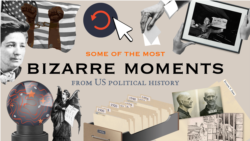ການເລືອກຕັ້ງຂອງສະຫະລັດໃນປີ 2024 ແມ່ນເຕັມໄປດ້ວຍເຫດການພິກຜັນຫຼາຍຢ່າງ ແຕ່ເຊື່ອຫຼືບໍ່ວ່າ ສິ່ງທີ່ແປກປະຫຼາດເຫຼົ່ານີ້ ໄດ້ເກີດຂຶ້ນໃນປະຫວັດສາດການເລືອກຕັ້ງ ສະຫະລັດມາແລ້ວ. ຈາກຜູ້ສະໝັກທີ່ຖືກກັກຂັງໄປຈົນເຖິງການຂົ່ມຂູ່ໃນການເລືອກຕັ້ງ, ອາເມຣິກາ ໄດ້ເຫັນມາທັງໝົດແລ້ວ.
ເລີ່ມຕົ້ນຈາກໃນປີ 1872, ເມື່ອ ທ່ານນາງ ວິກຕໍເຣຍ ວູດຮໍລ໌ (Victoria Woodhull) ພະຍາຍາມ ລົງແຂ່ງຂັນຊິງຕໍາແໜ່ງເປັນປະທານາທິບໍດີແມ່ຍິງຄົນທໍາອິດຂອງ ອາເມຣິກາ.
ແຕ່ບໍ່ເປັນຈັ່ງໂຊກ, ມັນໄດ້ມີບັນຫາຢູ່ນຶ່ງຄື ແມ່ຍິງຈະບໍ່ໄດ້ຮັບສິດໃຫ້ລົງຄະແນນສຽງເລືອກຕັ້ງທົ່ວປະເທດ ເປັນເວລາອີກ 50 ປີ.
ເຊັ່ນດຽວກັນກັບການບໍ່ສາມາດລົງຄະແນນສຽງໃຫ້ຕົນເອງໄດ້ນັ້ນ ແມ່ນເປັນເລື້ອງແປກພໍແລ້ວ, ຜູ້ມີຄວາມສາມາດພິເສດ ແລະ ຜູ້ສະຫນັບສະຫນູນ "ການມີເພດສໍາພັນແບບອິດສະຫຼະ" ນີ້ ໄດ້ຖືກຂັງຄຸກ ໃນມື້ເລືອກຕັ້ງ ສຳລັບຂໍ້ກ່າວຫາ "ການກະທຳອະນາຈານ" ເຊິ່ງໄດ້ກີດກັ້ນນາງ ບໍ່ໃຫ້ລົງຄະແນນສຽງ ເຖິງແມ່ນວ່ານາງຈະສາມາດລົງຄະແນນສຽງໄດ້ກໍຕາມ.
ນອກຈາກນີ້, ມັນຍັງເປັນປີດຽວກັນ ທີ່ຜູ້ສະໝັກຊິງຕໍາແໜ່ງປະທານາທິບໍດີ ໄດ້ເສຍຊີວິດ ກ່ອນທີ່ ຂະບວນການເລືອກຕັ້ງຈະສິ້ນສຸດລົງ.
ທ່ານ ຮໍເຣັສ ກຣີລີ (Horace Greely) ແພ້ຄະແນນນິຍົມໃຫ້ທ່ານ ຢູລິສຊີສ ເອັສ. ແກຣນທ໌ (Ulysses S. Grant) ແຕ່ໄດ້ເສຍຊີວິດຢ່າງກະທັນຫັນ ກ່ອນຄະນະຜູ້ແທນຂອງລັດຈະປະຊຸມກັນ. ສະມາຊິກຜູ້ແທນ 3 ທ່ານ ຍັງພະຍາຍາມໃຫ້ຄຳໝັ້ນສັນຍາວ່າ ແນວໃດກໍຕາມ ກໍຍັງຈະລົງຄະແນນສຽງໃຫ້ກັບຜູ້ສະໝັກທີ່ເສຍຊີວິດໄປແລ້ວ.
ສີ່ປີຕໍ່ມາ, ໃນການເລືອກຕັ້ງປີ 1876 ລະຫວ່າງ ທ່ານ ຣູເທີຟອດ ບີ. ເຮສ (Rutherford B. Hayes) ແລະທ່ານ ສາມູເອລ ເຈ. ທີລເດັນ (Samuel J. Tilden) ແມ່ນຖືວ່າເປັນນຶ່ງໃນການເລືອກຕັ້ງ ສະຫະລັດ ທີ່ມີ “ການແບ່ງແຍກ” ທີ່ສຸດ, ເນື່ອງຈາກຄວາມຂັດແຍ້ງທາງດ້ານການເມືອງ, ຜົນການ ເລືອກຕັ້ງທີ່ຂັດແຍ້ງກັນ, ແລະການກ່າວຫາກ່ຽວກັບການສໍ້ໂກງ.
ແລະ ແນ່ນອນວ່າ ມີການສໍ້ໂກງ: ນັບຕັ້ງແຕ່ການຍັດກ່ອງລົງຄະແນນສຽງ ໄປຈົນເຖິງການຂົ່ມຂູ່ຜູ້ມີສິດລົງຄະແນນສຽງ, ເຊິ່ງໄດ້ເຮັດໃຫ້ເກີດຄວາມວຸ່ນວາຍຢ່າງກວ້າງຂວາງຢູ່ບ່ອນປ່ອນບັດ. ໃນທີ່ສຸດ ທ່ານ ເຮສ (Hayes) ກໍ່ໄດ້ຮັບຕໍາແໜ່ງປະທານາທິບໍດີ ຫຼັງຈາກຕົກລົງຢຸດຕິການຟື້ນຟູຄືນໃຫມ່ຫຼັງສົງຄາມ ກາງເມືອງ ຢູ່ໃນຂໍ້ຕົກລົງແບບລັບໆ ເຊິ່ງນໍາໄປສູ່ການບັງຄັບໃຊ້ກົດໝາຍ ຈິມ ໂຄຣ (Jim Crow) ທີ່ບັງຄັບໃຊ້ການແບ່ງແຍກທາງເຊືຶ້ອຊາດຜິວພັນ.
ເມື່ອກ້າວເຂົ້າສູ່ຊຸມປີ 1900, ແລະຊ່ວງເວລາຂອງການເລືອກຕັ້ງທີ່ບໍ່ປົກກະຕິຍັງເກີດຂຶ້ນຢ່າງຕໍ່ເນື່ອງ. ຍົກຕົວຢ່າງຂອງ ທ່ານ ຢູຈິນ ວີ. ເດບສ໌ (Eugene V. Debs), ຜູ້ທີ່ລົງສະໝັກເປັນປະທານາ ທິບໍດີຈາກຄຸກໃນປີ 1920 ແລະໄດ້ຮັບເກືອບ 1 ລ້ານຄະແນນສຽງ. ທ່ານ ເສຍໄຊໃຫ້ທ່ານ ວໍເຣນ ຈີ. ຮາດິງ (Warren G. Harding), ແຕ່ປະທານາທິບໍດີກໍໄດ້ຫຼຸດໂທດລາວລົງ.
ຫຼືໃນປີ 1948, ເມື່ອ ໜັງສືພິມ ຊີຄາໂກ ໄທຣບຸນ (Chicago Tribune) ປະກາດຜູ້ຊະນະຜິດຄົນ ໃນໜ້າທຳອິດຂອງຕົນ ຫຼັງຈາກເກີດຄວາມວຸ້ນວາຍຄັ້ງໃຫຍ່ທີ່ສຸດຄັັ້ງນຶ່ງໃນປະຫວັດສາດ ການເມືອງ ຂອງສະຫະລັດ. ໄຊຊະນະທີ່ບໍ່ຄາດຄິດຂອງທ່ານ ແຮຣີ ທຣູແມນ (Harry Truman), ເຊິ່ງຖືກພົບ ເຫັນຢູ່ໃນຮູບຖ່າຍທີ່ມີຊື່ສຽງເຊິ່ງທ່ານ ໄດ້ຖືເຈ້ຍທີ່ບໍ່ຖືກຕ້ອງນັ້ນ, ໄດ້ເຮັດໃຫ້ຄົນທັງປະເທດ ບໍ່ຢາກ ຈະເຊື່ອ.
ບາງຄົນອາດຈື່ຈຳໄດ້ເຖິງຄວາມວຸ້ນວາຍໃນປີ 2000 ທີ່ສຽງສ່ວນຫຼາຍເຊິ່ງເກືອບຈະບໍ່ເຫັນຄວາມແຕກ ຕ່າງກັນ ໃນລັດ ຟລໍຣີດາ ຈົນກະຕຸ້ນໃຫ້ມີການນັບຄະແນນຄືນໃໝ່ ແລະການຕໍ່ສູ້ທາງດ້ານກົດໝາຍ. ນຶ່ງໃນຄວາມຂັດແຍ້ງທີ່ໃຫຍ່ທີ່ສຸດແມ່ນ "ບັດລົງຄະແນນສຽງທີ່ບໍ່ສົມບູນຄົບຖ້ວນ," ເຊິ່ງເປັນຊື່ທີ່ໃຊ້ ສໍາລັບບັດລົງຄະແນນສຽງທີ່ໃສ່ຂໍ້ມູນບໍ່ຄົບຖ້ວນ ທີ່ບໍ່ໄດ້ເຈາະເຈ້ຍທັງຫມົດ.
ໃນທີ່ສຸດ ສານສູງສຸດ ກໍໄດ້ຢຸດການນັບບັດຄະແນນຄືນໃໝ່ ແລະໄດ້ມອບຕຳແໜ່ງປະທານາທິບໍດີ ຈອດຈ໌ ດັບເບີລຢູ. ບຸຊ (George W. Bush) ເຖິງແມ່ນວ່າຝ່າຍກົງກັນຂ້າມຂອງທ່ານ, ຄືທ່ານ ອາລ ກໍ (Al Gore), ຈະໄດ້ຊະນະຄະແນນນິຍົມແບບວຸດຫວິດກໍຕາມ.
ແທ້ຈິງແລ້ວ, ມີຫຼາຍຢ່າງທີ່ສາມາດຮຽນຮູ້ໄດ້ຈາກເຫດການທາງດ້ານການເມືອງ ໃນຕະຫຼອດໄລຍະ ປະຫວັດສາດທີ່ຜ່ານມາ ສະເໝີ.
ແຕ່ເມື່ອມີການຄາດເດົາໃຫມ່ໆ ກ່ຽວກັບການສໍ້ໂກງ, ຜູ້ສະຫມັກຊິງຕໍາແໜ່ງປະທານາທິບໍດີຍິງອີກຄົນນຶ່ງ, ຄວາມຂັດແຍ້ງທີ່ເພີ້ມຫຼາຍຂຶ້ນ, ແລະ ແມ່ນແຕ່ຄຳແນະນຳທີ່ວ່າຜູ້ສະຫມັກຄວນຈະຕ້ອງຕິດຄຸກ, ຄົນເຮົາກໍ ອົດບໍ່ໄດ້ທີ່ຈະຕັ້ງຄຳຖາມວ່າ: ປະຫວັດສາດກຳລັງຈະເກີດຂຶ້ນອີກເທື່ອນຶ່ງ ຫຼືບໍ່?
ໃນຂະນະທີ່ສະຫະລັດ ຫຍັບເຂົ້າໃກ້ລະດູການເລືອກຕັ້ງທີ່ເຂັ້ມຂຸ້ນອີກຄັ້ງນຶ່ງ, ຄໍາຖາມຫຼັກໆກໍແມ່ນ: ເຫດການທີ່ຜິດປົກກະຕິເຫດການໃດ ທີ່ການເລືອກຕັ້ງປີ 2024 ຈະເພີ່ມເຂົ້າໄປໃນປະຫວັດສາດ ທາງດ້ານການເມືອງຂອງປະເທດ?
ອ່ານລາຍງານນີ້ເປັນພາສາອັງກິດ
The run-up to the 2024 U.S. election has been full of twists and turns but, believe it or not, stranger things have happened in U.S. election history. From incarcerated candidates to electoral mayhem, America has seen it all.
Let’s start with 1872, when Victoria Woodhull tried to run as America’s first female presidential candidate.
Unfortunately, there was one problem. Women wouldn’t gain nationwide voting rights for another 50 years.
As if being unable to vote for herself was unusual enough, the clairvoyant and “free sex” advocate was imprisoned on election day for “obscenity” — preventing her from voting even if she could.
It was also the only year a presidential candidate died before the election process concluded.
Horace Greely had lost the popular vote to Ulysses S. Grant but suddenly died before the Electoral College could meet. Three electors still tried to pledge their votes to the dead candidate anyway.
Four years later, the 1876 election between Rutherford B. Hayes and Samuel J. Tilden is considered one of the most “divisive” U.S. elections, thanks to political conflict, disputed results, and allegations of fraud.
And fraud there certainly was: from the stuffing of ballot boxes to intimidation of voters, there was widespread chaos at the polls. Hayes was eventually awarded the presidency after agreeing to end Reconstruction in a back-room deal— leading to the rise of Jim Crow laws.
Fast forward to the 1900s, and the unusual election moments keep coming. Take Eugene V. Debs, who ran for president from prison in 1920 and gained almost 1 million votes. He lost out to Warren G. Harding, but the president did commute his sentence.
Or 1948, when the Chicago Tribune declared the wrong winner on its front page after one of the greatest upsets in U.S. political history. Harry Truman's unexpected victory, captured in the famous photograph where he holds the inaccurate paper, left the nation in disbelief.
Some may also remember the 2000 debacle in which a razor-thin majority in Florida prompted recounts and legal battles. One of the biggest controversies was "hanging chads," the name for incomplete ballots that weren’t wholly punched through.
The Supreme Court eventually halted the recount and handed the presidency to George W. Bush even though his opposition, Al Gore, narrowly won the popular vote.
Indeed, there’s always a lot to learn from political events throughout history.
But with renewed speculation about fraud, another female presidential candidate, mounting polarization, and even suggestions of candidates doing jail time, one can’t help but ask: could history be repeating itself?
As the United States moves closer to another intense election season, the main question is: what unusual events will the 2024 election add to the country's political history?






ຟໍຣັມສະແດງຄວາມຄິດເຫັນ